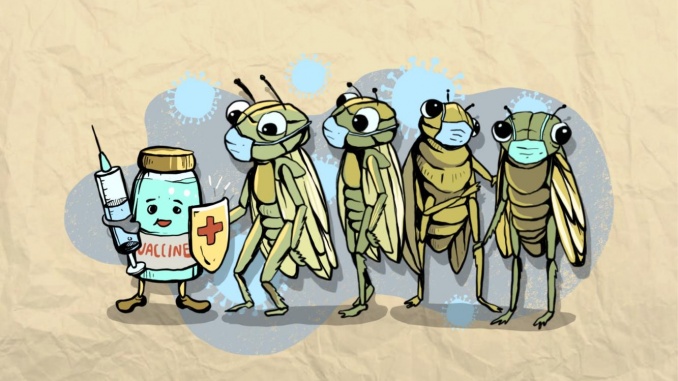
Savannah Gresham | Writer
May 28 2021
The cicadas are back. Billions of them. Maybe even trillions. While this is great news for birds and fans of exotic cuisine, it is bad news for light sleepers, new car owners, and certain types of plants. If you’re unfamiliar with cicadas, don’t feel bad — the last time the cicadas swarmed was probably before you were born. This particular crop or “brood” of cicadas has been asleep for 17 years, in larval form, and will be emerging soon to sing their 90-decibel mating song for the duration of their extremely short, weeks-long life as non-larval adults. Many will quickly become car hood ornaments. Many others will become bird food. But for a lucky few billion of them, they will find their bug-eyed soulmate and send a new generation of cicadas underground for another 17 years, until that generation emerges in 2038 — just in time to be seen by your toddlers or be hit by your super cool, electric minivan.
But rather than catch you up on the cicadas, I thought it would be nice to direct this article to the cicadas themselves, to help get them up to speed on what they have missed in the last 17 years. So cicadas, here are some highlights, delivered as succinctly as possible so as not to take you too long to read:
Technology. In 2007, this thing called an “iPhone” came out. For humans, this was truly life-changing. The iPhone, and the innumerable copycat devices that followed, took humans that were walking upright and slouched them back over like Cro-Magnons. If you see a slouching human during your travels, you likely are watching a person use one of these devices while they are trying to walk. The iPhone also metamorphosed human language and communication, rendered obsolete things like cameras, calculators, CDs, DVDs, paper, pencils, and the human senses of smell, taste and touch. Fasten your seatbelts, bugs, human culture has changed in 17 years — like, a lot.
Politics. Honestly, the less said about this, the better. I’ll just let you know, if this cycle we don’t seem particularly phased by the nightmarish plague of red-eyed demon bugs (no offense) descending upon us — we’ve all had a wild few years. Who knows, some of us may even consider the maddening din of your mating song to be a gentle reprieve from the day’s breaking news.
Housing. Human housing seems to always be in short supply. In the US, housing prices spiked, crashed, and spiked again. This seems recurrent, much like your cicada life cycles. Now you may be asking why a cicada like yourself should care about this. Well, that is because human houses are largely built from wood, and wood comes from trees. Yes, you might be able to see where I’m going with this. We may or may not have appropriated several thousands of your deciduous houses to supplement our ever-dwindling supply. Ok, we did, there are a lot less trees in the world than there were in 2004, when you went down there. Look, that’s our bad, but hey — we’re working on it!
Environment. If the temperature feels different this time, it might be more than temporary. Maybe leave the jacket in the tree for this cycle? Just a suggestion. Oh, and grab some sunscreen.
Birds. Birds are the same. Keep your crimson eyes open, all you handsome hemiptera — those lovely cicadies aren’t the only ones bewitched by the dulcet rubbing of your wings!
That seems like enough cicada advice for this forum. For you human readers, get ready to be bugged. That said, it’s important to remember that while this may seem to be yet another minor horror on your plate, these creatures provide a valuable benefit to our ecosystem — so try to go easy on the little guys, it’s not like they asked to be abominations! If befriending the cicadas is too much to ask (understandable), then I would at least beseech you to take a step back and appreciate this rare spectacle for what it is. Oh, the stories you will be able to tell your children before they sit down for breakfast class, with their hyphenated names, physically implanted meme machines, and manic-depression!

Leave a Reply